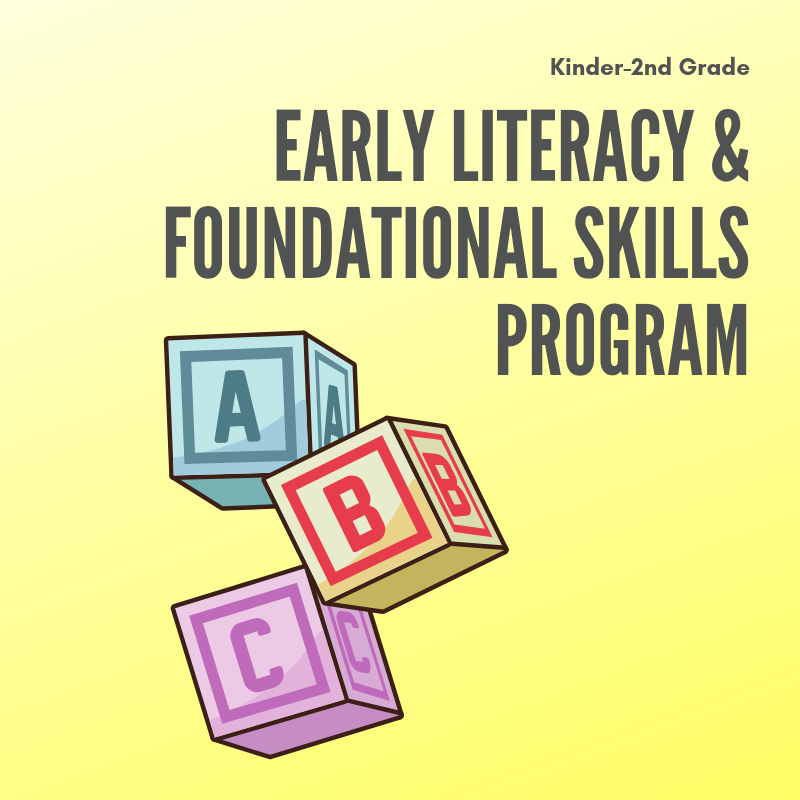“Just give them time.”
“They’re young.”
“They’ll catch up.”
These are the lines that parents of struggling readers in kindergarten and 1st grade are all too familiar with. While these primary students are young in age, research has shown us “The importance of early reading cannot be understated. Children who struggle with reading in the early grades often remain behind their peers throughout school, and academic progress in all subject areas suffers (McIntyre et al., 2005).”
““Children who struggle with reading in the early grades often remain behind their peers throughout school, and academic progress in all subject areas suffers.””
The reality is, students who demonstrate difficulty with foundational skills essential to reading such as: alphabetic knowledge, phonemic awareness, and phonics are at a greater risk for reading failure.
Unfortunately, for these students, research has shown us that students who struggle to read in 1st grade rarely catch up to their peers. Likewise, 75% of students who struggle with reading in 3rd grade continue to struggle in high school and beyond.
This comes as no surprise as the most recent national report card shows that only 36% of 4th graders are reading at a proficient level, while only 34% are in 8th grade.
Sadly, the consequences of reading failure extends far beyond school. Long-term effects for students with persistent reading difficulties include: higher drop-out rates, increased unemployment rates, and higher chances of being involved in criminal behavior leading to incarceration.
The good news is, with early intensive intervention/reading therapy, students with reading difficulties can make good progress and begin to close the gap between them and their same age peers.
Time is of the essence. When parents and teachers begin to notice characteristics of of reading difficulty, help should not be delayed. With frequent, purposeful, on-going intervention, taught by experienced reading specialists, students can begin to make great progress.
The best types of early intervention include instruction and practice in areas including: letter recognition, phonemic awareness, and phonics.
Letter Recognition - The ability to accurately recognize and provide the name of each letter of the alphabet.
Phonemic Awareness - The ability to hear, recognize, and manipulate individual sounds.
Phonics - The ability to make a connection between letters or groups of letters and their corresponding sound.
Listening Comprehension - The ability to listen and understand spoken word in order to make meaning.
Despite even the highest quality of instruction in school, we know there are students who will still need additional support outside of the classroom. ProLearning, a supplemental learning and tutoring center in Arlington, TX, offers a small group class, Early Literacy and Foundational Skills Program, specifically to address the early reader in kinder, 1st, and 2nd grade who has demonstrated difficulty learning to read.
The Early Literacy and Foundational Skills Program meets 3 times a week to help students progress at an increased rate. Our goal is to be proactive by providing early intervention and to place each student on track for reading success.
How can you tell what is developmentally appropriate and what is cause for concern for your early reader? The following list can help guide you in deciding whether you should consider early intervention reading tutoring or therapy from a specialist:
Difficulty recognizing and learning the spelling of their name
Difficulty with learning the names and sounds of letters
Easily confused with similarly shaped letters (i.e. p, q, b, d)
Difficulty with remembering the sequence of the alphabet (without singing the song)
Difficulty with learning high-frequency words
Unable to successfully recognize or produce words that rhyme
Difficulty with blending sounds together (without letters, i.e. /b/ /a/ /t/ = bat)
Difficulty segmenting (unblending) words to hear individual sounds (without letters, i.e. frog = /f/ /r/ /o/ /g/
Difficulty blending letter sounds together to read words (decoding)
Skips words in reading and doesn’t stop to self-correct
Frequently guesses at unknown words
It is important to remember that students may exhibit some struggle when these items are initially introduced to the student. However, after much practice, these red-flags should not be ignored. Early intervention matters and can make the difference between a successful reader and a student that experiences years of frustration.
If your child has exhibited any of the above characteristics or you still have questions regarding your kindergarten, 1st grade, or 2nd grade students’ ability, we can help! Contact us today to schedule a free consultation!
Our small group semi-private tutoring Early Literacy and Foundational Skills program in Arlington, TX (kinder, 1st & 2nd grade) is designed with beginning readers in mind. Focused on essential literacy skills such as: phonemic awareness, phonics, fluency, and comprehension; students will begin to learn to unlock the “code” for reading. Set your child up for success by enrolling in our early intervention program.
Resources:
Catch Them Before They Fall: Identification and Assessment to Prevent Reading Failure in Young Children Reading Rockets
Early Signs of a Reading Difficulty Reading Rockets
Supplemental Instruction in Early Reading: Does It Matter for Struggling Readers? The Journal of Educational Research (Ellen McIntyre et al.)
Persistence of Dyslexia: The Connecticut Longitudinal Study at Adolescence. American Academy of Pediatrics (Shaywitz et al.)



